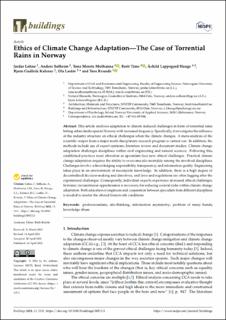| dc.contributor.author | Lohne, Jardar | |
| dc.contributor.author | Solheim, Anders | |
| dc.contributor.author | Muthanna, Tone Merete | |
| dc.contributor.author | Time, Berit | |
| dc.contributor.author | Hauge, Åshild Lappegard | |
| dc.contributor.author | Kalsnes, Bjørn | |
| dc.contributor.author | Lædre, Ola | |
| dc.contributor.author | Kvande, Tore | |
| dc.date.accessioned | 2023-08-18T13:28:37Z | |
| dc.date.available | 2023-08-18T13:28:37Z | |
| dc.date.created | 2023-04-24T10:36:28Z | |
| dc.date.issued | 2023 | |
| dc.identifier.citation | Buildings. 2023, 13 (5), 1111. | en_US |
| dc.identifier.issn | 2075-5309 | |
| dc.identifier.uri | https://hdl.handle.net/11250/3084860 | |
| dc.description | © 2023 by the authors. Licensee MDPI, Basel, Switzerland. This article is an open access article distributed under the terms and conditions of the Creative Commons Attribution (CC BY) license. | en_US |
| dc.description.abstract | This article analyses adaptation to climate induced challenges in form of torrential rains hitting urban landscapes in Norway with increased frequency. Specifically, it investigates the influence of the industry structure on ethical challenges when the climate changes. A meta-analysis of the scientific output from a major multi-disciplinary research program is carried out. In addition, the methods include use of expert opinions, literature review and document studies. Climate change adaptation challenges disciplines within civil engineering and natural sciences. Following this, established practices need alteration as specialists face new ethical challenges. Practical climate change adaptation requires the ability to overcome silo mentality among the involved disciplines. Challenges involve acknowledging responsibility, transparency, and information quality. Engineering takes place in an environment of incomplete knowledge. In addition, there is a high degree of
decentralised decision-making and directives, and laws and regulations are often lagging after the experienced challenges. Consequently, individual experts experience increased ethical challenges. Systemic circumstances apprehension is necessary for reducing societal risks within climate change adaptation. Both education of engineers and cooperation between specialists from different disciplines is needed to master the altered framework conditions. | en_US |
| dc.language.iso | eng | en_US |
| dc.rights | Navngivelse 4.0 Internasjonal | * |
| dc.rights.uri | http://creativecommons.org/licenses/by/4.0/deed.no | * |
| dc.subject | professionalism | en_US |
| dc.subject | silo-thinking | en_US |
| dc.subject | information asymmetry | en_US |
| dc.subject | problem of many hands | en_US |
| dc.subject | knowledge abuse | en_US |
| dc.title | Ethics of Climate Change Adaptation -The Case of Torrential Rains in Norway | en_US |
| dc.type | Peer reviewed | en_US |
| dc.type | Journal article | en_US |
| dc.description.version | publishedVersion | en_US |
| dc.subject.nsi | VDP::Samfunnsvitenskap: 200 | en_US |
| dc.source.volume | 13 | en_US |
| dc.source.journal | Buildings | en_US |
| dc.source.issue | 5 | en_US |
| dc.identifier.doi | 10.3390/buildings13051111 | |
| dc.identifier.cristin | 2142757 | |
| dc.relation.project | Norges forskningsråd: 237859 | en_US |
| dc.source.articlenumber | 1111 | en_US |
| cristin.ispublished | true | |
| cristin.fulltext | original | |
| cristin.qualitycode | 1 | |

